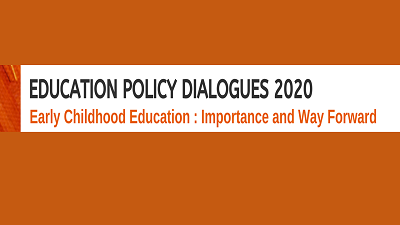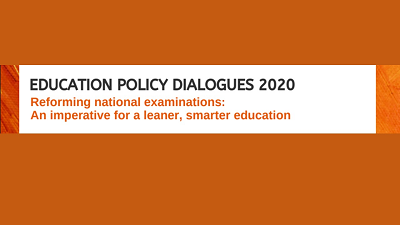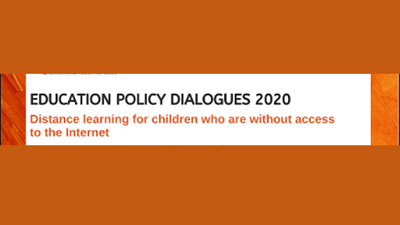
EFSL held a Policy Dialogue via zoom on Early Childhood Education and the way to move forward on Saturday, the 27th of June 2020. It was attended by primary school principals, researchers, university lecturers and teachers. Presenter: Dr Ravi Nanayakkara, Project Director, Early Childhood Development Project, Ministry of Women & Child Affairs Watch video here. Summary of presentation and discussion: Early Childhood is defined as period between 0-5 years 0-2 is home-based care and the Ministry of Health has on-going programs using Public Health Nurses, Public Health Midwives and the Medical Officers of Health 3 to 5 years is the period that ECE usually operates Golden 1000 Days in a child’s life is critical, because brain growth is maximum during this period. About 85% of brain growth of an entire life happens during early childhood.

Held on June 13, 2020, via Zoom Video: https://www.facebook.com/watch/?v=1021915811544559 Presentation: Dr. Sujata Gamage presented “An Assessment Framework with Built-in Accountability for Reforming the National Examination System in Sri Lanka”.
In Sri Lanka, with a population of 22 million, 11,000 schools closed on March 12th affecting 4.5 million students. The situation in Indonesia parallels Sri Lanka though Indonesia’s population at 268 million is ten times that of Sri Lanka. According to a World Bank blog, in Indonesia, over 530,000 schools closed affecting 65 million students. The situation is forcing a very fast and broad increase in the country’s use of EdTech, which is expected to have lasting effects on the market.

Held on May 16, 2020, via Zoom. Video: https://www.facebook.com/EduForumLK/videos/726016001268499/ Presentation (Who has Access?): https://lirneasia.
It is heartening to note that the decision to reopen schools on May 11th has been reconsidered positively. Exposing 4.3 million school children to a potential resurgence of the virus with no clear plan would have been dangerous, when we still haven’t had a straight 48-72 hours without a single Covid patient being reported. Sanitizing all schools effectively would need time and resources. Overcrowding of classrooms in urban/popular schools, inability to implement safe-distancing methods and lack of adequate facilities for hand-hygiene, are all reasons to consider before announcing re-opening.
Capitalizing on the need to switch to distance learning (DL) Sri Lanka like all countries had to find alternate methods of education when school closure became a necessity during Covid 19. Many countries in the West & East seamlessly switched to e-learning & online education, since their curricula & syllabuses were already posted on the education websites, and e-learning had been practiced interspersed with face-to-face learning in class, even before Covid. Good example is Singapore, where once a week, e-learning had been a practice for several grades. So an abrupt and total switch was effortless for them. What’s the story with Sri Lanka?
May 11, 2020 මà·à¶»à·Šà¶à·” 12ද෠හදිසියේ පà·à·ƒà¶½à·Š වස෠දà·à¶¸à·“මà¶à·Š සමග à·à·Šà¶»à·“ ලංකà·à·€à·š අධ්යà·à¶´à¶± පද්ධà¶à·’ය à¶à·”à·… අර්බුදයක් නිර්මà·à¶«à¶º විය. එක රà·à¶ºà·’න් à¶à¶¸ ඉගà·à¶±à·Šà·€à·“ම් ක්රමය අන්à¶à¶»à·Šà¶¢à·à¶½à¶º පà·à¶¯à¶š කරගෙන දුරස්ථ ආකà·à¶»à¶ºà¶§ à·„à·à¶©à¶œà·ƒà·Šà·€à· ගà·à¶±à·“මට ගුරුවරුන්ට සිදු විය. අගà·à·ƒà·Šà¶à·” මà·à·ƒà¶ºà·š සිට ඉදිරියට පà·à·€à·à¶à·Šà·€à·™à¶± පහ à·à·Šà¶»à·šà¶«à·’යේ à·à·’ෂ්යà¶à·Šà·€ විභà·à¶œà¶º, අ.පො.à·ƒ.
May 12, 2020 With the sudden closure of schools on March 12th, the Sri Lankan education system plunged into a crisis. Overnight teachers had to gear themselves for on-line teaching and other methods of distance education. The GOSL swiftly moved in to address the concerns of students preparing for Grade 5 Scholarship examination and Ordinary Level and Advanced level examinations, due to start from August, by telecasting lessons for those students. However, the schools were not at all prepared for a distance learning mode, and hence innovation became an urgent necessity to reach out to the full student population. Further, Covid-19 is not going be fully curtailed anytime soon.
The primary source of digital resources in Estonia is e-Koolikott (“e-Schoolbagâ€), a nationwide online library of more than 20,000 educational resources. Teachers, subject specialists, universities, and private publishers can all post resources to e-Schoolbag, and groups of subject-area experts are responsible for reviewing the resources for quality. Teachers can then use and adapt these resources for their lessons, including organizing and saving related resources into personal “learning kits.†Parents and guardians also have access to e-Schoolbag to support children’s learning at home, as was the case before school closures. A second initiative is a list of online learning resources by subject, purpose, or grade span, including tools developed by Estonia’s robust educational technology sector.
As part of the on-going discussions on Home-Based-learning, the EFSL team had an informative discussion with Yarl IT Hub, Mr Balathasan Sayanthan on the innovations introduced through their digital learning platforms and the response from students during this Covid period. The platform has delivered content to large numbers of students for Tech Learning, Advanced level revision as well as for Grade 5 scholarship students. Yarl IT Hub is a not-for-profit social enterprise managed by a group of talented young tech-people, which also collaborates with the Northern Province Education Department on specific projects.
 EFSL held a Policy Dialogue via zoom on Early Childhood Education and the way to move forward on Saturday, the 27th of June 2020. It was attended by primary school principals, researchers, university lecturers and teachers. Presenter: Dr Ravi Nanayakkara, Project Director, Early Childhood Development Project, Ministry of Women & Child Affairs Watch video here. Summary of presentation and discussion: Early Childhood is defined as period between 0-5 years 0-2 is home-based care and the Ministry of Health has on-going programs using Public Health Nurses, Public Health Midwives and the Medical Officers of Health 3 to 5 years is the period that ECE usually operates Golden 1000 Days in a child’s life is critical, because brain growth is maximum during this period. About 85% of brain growth of an entire life happens during early childhood.
EFSL held a Policy Dialogue via zoom on Early Childhood Education and the way to move forward on Saturday, the 27th of June 2020. It was attended by primary school principals, researchers, university lecturers and teachers. Presenter: Dr Ravi Nanayakkara, Project Director, Early Childhood Development Project, Ministry of Women & Child Affairs Watch video here. Summary of presentation and discussion: Early Childhood is defined as period between 0-5 years 0-2 is home-based care and the Ministry of Health has on-going programs using Public Health Nurses, Public Health Midwives and the Medical Officers of Health 3 to 5 years is the period that ECE usually operates Golden 1000 Days in a child’s life is critical, because brain growth is maximum during this period. About 85% of brain growth of an entire life happens during early childhood.  EFSL held a Policy Dialogue via zoom on Early Childhood Education and the way to move forward on Saturday, the 27th of June 2020. It was attended by primary school principals, researchers, university lecturers and teachers. Presenter: Dr Ravi Nanayakkara, Project Director, Early Childhood Development Project, Ministry of Women & Child Affairs Watch video here. Summary of presentation and discussion: Early Childhood is defined as period between 0-5 years 0-2 is home-based care and the Ministry of Health has on-going programs using Public Health Nurses, Public Health Midwives and the Medical Officers of Health 3 to 5 years is the period that ECE usually operates Golden 1000 Days in a child’s life is critical, because brain growth is maximum during this period. About 85% of brain growth of an entire life happens during early childhood.
EFSL held a Policy Dialogue via zoom on Early Childhood Education and the way to move forward on Saturday, the 27th of June 2020. It was attended by primary school principals, researchers, university lecturers and teachers. Presenter: Dr Ravi Nanayakkara, Project Director, Early Childhood Development Project, Ministry of Women & Child Affairs Watch video here. Summary of presentation and discussion: Early Childhood is defined as period between 0-5 years 0-2 is home-based care and the Ministry of Health has on-going programs using Public Health Nurses, Public Health Midwives and the Medical Officers of Health 3 to 5 years is the period that ECE usually operates Golden 1000 Days in a child’s life is critical, because brain growth is maximum during this period. About 85% of brain growth of an entire life happens during early childhood.  Held on June 13, 2020, via Zoom Video: https://www.facebook.com/watch/?v=1021915811544559 Presentation: Dr. Sujata Gamage presented “An Assessment Framework with Built-in Accountability for Reforming the National Examination System in Sri Lanka”.
Held on June 13, 2020, via Zoom Video: https://www.facebook.com/watch/?v=1021915811544559 Presentation: Dr. Sujata Gamage presented “An Assessment Framework with Built-in Accountability for Reforming the National Examination System in Sri Lanka”.  Held on May 16, 2020, via Zoom. Video: https://www.facebook.com/EduForumLK/videos/726016001268499/ Presentation (Who has Access?): https://lirneasia.
Held on May 16, 2020, via Zoom. Video: https://www.facebook.com/EduForumLK/videos/726016001268499/ Presentation (Who has Access?): https://lirneasia. 